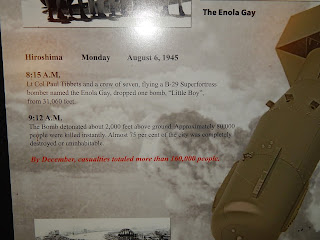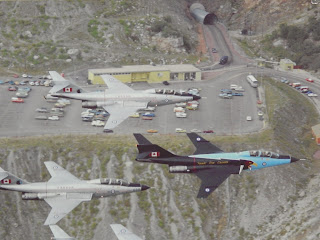Monument, Colorado
High 81 Low 61
The weather since we have been here has been absolutely delightful.
It has been cool enough at night that we have been able to sleep with the
windows open. Afternoon thundershowers are predicted for the next few days, but
we hope not.
Today we decided to go see the Peterson Air and Space
Museum. We went to the gate we were told only to find it closed and locked. We then
went to another gate and were told to go to still another gate. They were
supposed to have our base passes ready for us at the gate, but-------someone
forgot to send over the paperwork. So as a consequence, we got to wait for almost
an hour while they checked us out. We weren’t alone since there were several
other cars in the same situation. We saw two cars leave because they got tired
of waiting.
Once we finally got on the Air Force base, we were able to
find the Museum with no problem. The docent in the Museum was very knowledgeable.
He told us about some small airplane models of all the countries involved in
the War hanging from the ceiling of the theater. It seem that during World War
II, to be a gunner on a plane you had to know which plane you were seeing from
just the silhouette. They asked school children to make the models, for which
they got a certificate for the help in the war effort. The gunner candidate had
to pass a test with 90 % accuracy. I assume so that he would not shoot down
friendly aircraft. There were over 10,000 model airplanes made that went to different Bases.
We then got to go to one of the hanger that housed a lot of
the displays, which included a plane and a missile control center. The docent
there told us how strict the firing of missiles was. There were enough
safeguards in place that it would have been very hard if not impossible to
accidentally fire any missiles.
There was one display that showed the layout of the Cheyenne
Mountain NORAD complex. The docent told us that the entrance tunnel was drilled
clear through the mountain so that if an attack were to take place, the
explosion would go clear through the mountain with no loss of the Control
Center. The buildings inside the mountain are two stories high and are sitting
on large springs which protect them from earthquakes and even a nuclear
explosion.
 |
| If you look carefully, you can see the mountain with all the antennas. That is Cheyenne Mountain. |
One chart on the wall showed where existing and former missile
sites were located. On the picture the ones with the red dots are the ones
still in use today.
 |
| This told about the bombing of Japan. Note the number of casualties. |
We were told that the saying “the whole 9 yards” came from
the length of the bullet belts that were loaded onto the plane. I looked on Wikipedia,
and while that was one explanation, it was felt that the saying had a much
earlier start than World War II.
We then went outside and looked at some of the planes
exhibited there, including a large radar plane that was in use until 1963. It
had a normal crew of 16 and as able to stay flying for 15 hours. There was a
lot of radar equipment on board, that would tell where any threats against the
United States might be.
 |
| The plane was airborne so long that they had a kitchen. |
 |
| This and the following charts were used to exactly pinpoint where the plane was. The navigator found the location of three stars and using the charts could see where they were. |
It was interesting seeing all the planes and displays. It was also refreshing to be able to take pictures in a Museum.
After the Museum we went to a "Farmers Market" in Monument. It was mostly craft items with the exception on one produce stand that wanted $4.00 for one tomato, which we declined.
Thanks for visiting.

























Sounds like it was worth the wait at the gates. All that technology and it is so outdated today. Very interesting.
ReplyDeleteWe were starting to wonder whether it was going to be worth the wait, but it was. Who remembers vacuum tubes? They were what operated all the radar equipment.
ReplyDelete